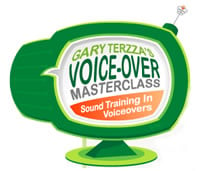Is your booking to audition ratio lower than you want it to be? Gary Terzza shares five common mistakes that voice talent make when auditioning for work. From not knowing what you should submit for to poor expectation setting, many of the chief contributors to lack of bookings are found in this helpful lesson. Gary leads you through each mistake and offers concrete advice on how to avoid them.
Links from today’s show:
Gary Terzza
Gary Terzza on Voices.com
Your Instructor this week:
 Gary Terzza is a professional voiceover and coach with a client list that includes Channel 4, Channel five, VH-1 and the BBC. He also runs a voice-over master class Association in Central London and Hertfordshire.
Gary Terzza is a professional voiceover and coach with a client list that includes Channel 4, Channel five, VH-1 and the BBC. He also runs a voice-over master class Association in Central London and Hertfordshire.
VO: Welcome to Voice Over Experts, brought to you by Voices.com, the number one voice over marketplace. Voice Over Experts brings you tips, pearls of wisdom and techniques from top instructors, authors and performers in the field of voice over. Join us each week to discover tricks of the trade that will help you to develop your craft and prosper as a career voice over talent. It’s never been easier to learn, perform and succeed from the privacy of your own home at your own pace. This is truly an education you won’t find anywhere else. Now for our special guest, Gary Terzza.
Gary: Voice overs can be frustrating. Work can seem tantalizingly close, but for some unfathomable reason you keep failing to win the jobs. In an attempt to help explain some of the reasons why, here are five mistakes you could be making.
One, inappropriate targeting – voice overs are not a numbers game. It’s not the amount of work you apply for but how selective you are. Too many voice actors spend far too long applying for gigs that are totally inappropriate for their voice type. If a voice over project is looking for a young cool voice, and you’re middle-aged and sound it, leave well alone. It may be paying a tempting fee, but you’ll be wasting your time, and the client’s, trying to sound like you’re 20 years younger. Become well acquainted with your voice and get to know what it sounds like to other people. You may think like you’re a sophisticate from Downton Abbey, but to the rest of the world, your accent may be more Bill Sikes, not that there’s anything wrong, of course, with sounding like a cockney ne’er do well. After all, Ray Winston makes a successful career out of it.
Number two, misreading scripts – recently I was listening to one of my student’s auditions for a furniture store. The name of the company contained a double T in the middle, which could have softened or hardened the preceding vowel. My student had chosen the harder version, but I was unsure. I made a quick call to one of their shops and asked the receptionist which was the correct pronunciation. I was right to be cautious. The company wanted their name to have the softer articulation. My student would have fallen at the first hurdle had she submitted the incorrect pronunciation. There’s nothing guaranteed to annoy a client more than hearing the name of their beloved business mispronounced by a voice over artist. A little research was all that was needed. Attention to detail is so important.
Three, expectations are too high. I had a message just before Christmas from someone who was complaining about the poor amount she was earning in voice overs. After expenses she’d calculated her profits to be just under £3,000, about $4,400 US. That was for a year, and she was very disappointed. “I was expecting around £20,000. That’s about $29,500,” she grumbled. When I probed further, she was doing hardly any marketing at all, spending most of her time on just one pay-to-play site. I recommended spreading her promotional wings far and wide. You can’t expect to earn larger sums if you’re not putting in the appropriate leg work.
Four, expectations are too low. On the other side of the coin are those newcomers who seem content with low paid gigs and fear making the step up to better paid work. They apply for too many student projects and balk at the idea of working for high-end clients who they fear may be more demanding. These low expectation folks convince themselves that cheap and cheerful is all they’re capable of. Now regular readers will know I recommend applying for lower paid jobs when you’re just starting out in voice overs. However, this should not be seen as a substitute for well-remunerated jobs. Indeed, these bargain basement gigs should act as a proving ground or springboard to better paid work. You’re always capable of much more.
Five, not taking the business side seriously enough. I think you should take your job seriously but not yourself. That is the best combination – Judi Dench. Be honest with yourself. Do you really run your voice over career like a company? Are you advertising, keeping accounts and working to your business plan? Do you consider yourself to be looking for voice over work or selling your voice over services? If it is the former, you need a radical rethink. You can’t expect clients to pay on time if you don’t issue an invoice with payment terms. Likewise, phoning a production company and making yourself seem desperate for work does not sound good. If you want to be professional present yourself as a pro.
Too many talents ignore this aspect – or at least don’t have a firm grip on the idea of running a business. They mistakenly assume it’s all about the sound of their voice. People often ask me, “Is there a market for my voice?” to which I reply, “Yes, there probably is, but are you willing to set up your stall and sell your voice? If you don’t somebody who sounds a little bit like you will.”
VO: Thank you for joining us. To learn more about the special guest featured in this Voices.com podcast, visit the Voice Over Experts show notes at Podcasts.Voices.com/voiceoverexperts. Remember to stay subscribed. If you’re a first-time listener, you can subscribe for free to this podcast in the Apple iTunes podcast directory or by visiting Podcasts.Voices.com. To start your voice over career online go to Voices.com and register for voice talent membership today.



Comments
Greetings. Thanks for the wonderful podcast on 5 mistakes you might be making that lose you voice over jobs. Ok, so I’ll ask the silly questions. As a newbie to the Voice Over business I have two questions.
1) How do you “promote”/”market” your voice?
2) How do you determine how others think your voice sound?
Question #2 may sound silly but honestly depending on who you ask (my observation/experience) is that you get a variety of responses. For me it’s typically “deep”, “nice”, “authoritative” and “big”. However, when I first did a demo tape for a local talent agency the gentleman noted I sounded younger than my actual age. I’m not going to be confused with a 20 something voice (although when I was in my 20’s and 30’s people thought I sounded older until they met me) and hence go for middle age. But again, curious to how you get an honest assessment of “how your voice sound”.
Gee, Larry, it’s been nearly a year since you posted your question. With the absence of any response, mine may serve to be of some value.
You sound the way you sound.
Not much help was it? But that’s the truth of it. You sound the way you sound. If you tried to sound different from the way you sound then it could be said of you, “He sounds like he’s trying to sound different.”
You will never be warmer, deeper, brighter, etc., and if you try you will sound like someone who is trying. Please don’t do that. Capitalize on what you have.
So, what do you have? Finish the sentence, “I sound like a … ” and fill in what ever characterization would fit nicely there. Have friends and family play along with “You sound like a … ” Whatever their answers, that’s your niche.
You sound like a giant. You sound like a cowboy! You sound like a radio DJ. You sound like a politician. and on, and on, and on. So, how do you sound?
I sound authoritative, one of those presentations one would never hear as “dry”. That’s not very flattering is it? But it is the truth! Now that we are armed with the truth we are invincible in our marketing. If the post for a job says, “Authoritative”, I send my demo in a no-nonsense way!
Record yourself, listen and allow yourself to be surprised, you sound like a …
Does that help?
jd
Good morning. I would like to know what people think about my voice. I would like a true observation . I need to get into what sells my voice and hoping to find a group or coach that can help with out being to costly thanks for reading
The background music was a bit loud. It was drowning out your voice.
Otherwise, good tips!
Excellent tips, Gary! I completely agree that misreading script is not an option and it is for this reason I always pre-read the script aloud. This helps me get familiar with technical terms and detect any errors in narration before I start recording.